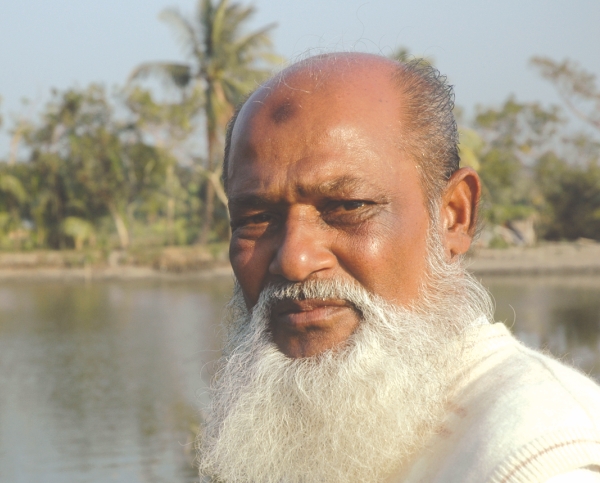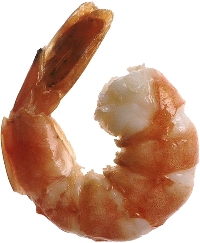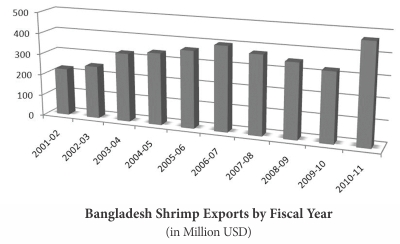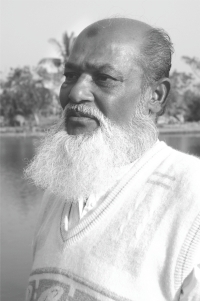|
Cover Story
Bagerhat

Keramat Ali's Freshwater Prawn
With the country's export revenue at 22.92 billion in FY 2010-11, shrimp exports represent just over 2 percent of the total. In FY 2010-11, Bangladesh exported 470 million USD worth of shrimp, up from 365 million USD the year before. And it is expected to surpass that total by much more in the current fiscal year, since export revenue from shrimp has already reached 278.6 million USD in the six months between July and December 2011. Roughly one-fourth of all shrimp exports from Bangladesh are freshwater shrimps. Who can imagine, that all that was instigated by Syed Keramat Ali, who, in 1978, capriciously released small prawns into a flooded rice field. Only three months later, he realized that he had serendipitously become the first freshwater prawn farmer of Bangladesh, setting off a chain reaction which would, in time, become a source of affluence for thousands of families of Bagerhat.
...............................................................................................................
Zahidul Naim Zakaria

The geology of areas like Foltita of Bagerhat is comparable to wetlands, to beels and hoars. These areas are inundated for a large part of the year, during the monsoon, allowing only one cropping season for rice (Irri). As a result, people of the waterlogged floodplains could not use their land for rice production multiple times every year like other areas of Bangladesh. They did not have enough food to eat, and made very little money. They were extremely poor. But this was the scenario more than three decades ago.
Freshwater prawn farming has changed life in Bagerhat completely. And the entire process of change was instigated by Syed Keramat Ali. The son of late Syed Yakub Ali, Keramat had joined the Police Force before liberation as a Sub-Inspector, but love for his motherland kept him at Bagerhat. On a fateful day in 1978, experimentally, he released prawn fingerlings into inundated rice fields. It was a stone thrown into the darkness. And he hit jackpot! In three months, he noticed how the fingerlings grew into large prawns. From the rice field that enabled him to earn around 1,200 taka a season; he earned 17,000 taka by selling prawn! That is a lot of money for a farmer, especially given the value of money three decades ago. And this wasn't even planned production.
 The news of Syed Keramat Ali's success spread in the area fast. Today, thousands of families of Bagerhat, Fakirhat, Mollarhat, Falatita, and the coastal areas of the Bay of Bengal are involved in shrimp farming. Shrimp farms account for over 80,000 hectares of land. People of these areas all know Keramat Ali by name, and know of his contribution. They say that he has shown the way to prosperity. People who could not eat twice a day now not only became solvent, but have built their own houses, eat well everyday and are able to send their children to school. The once underdeveloped community is now able to use modern amenities of life. Hundreds of thousands of people from other areas are working in Bagerhat now as labour in shrimp farms. It's been three decades since Keramat Ali started producing freshwater prawns, and since then he has shown millions of people the way to a better life. He was first brought to the limelight on BTV in 1992 by Shykh Seraj, and follow-up television programmes about him were broadcasted by Channel i more recently. In 2008, he was awarded the 3rd Channel i Krishi Padak. The media also played a role in spreading the knowledge that Keramat Ali had gained, and encouraged many others to join the trade. In 2010-11, shrimp farming accounted for over three thousand three hundred crore taka worth of exports (USD 470 million). Although shrimp exports represent only 2% of total exports, it should be noted that shrimp is being exported to more than 40 countries. Only a handful of products have such a diversified export base (although most of those countries are part of the EU). The news of Syed Keramat Ali's success spread in the area fast. Today, thousands of families of Bagerhat, Fakirhat, Mollarhat, Falatita, and the coastal areas of the Bay of Bengal are involved in shrimp farming. Shrimp farms account for over 80,000 hectares of land. People of these areas all know Keramat Ali by name, and know of his contribution. They say that he has shown the way to prosperity. People who could not eat twice a day now not only became solvent, but have built their own houses, eat well everyday and are able to send their children to school. The once underdeveloped community is now able to use modern amenities of life. Hundreds of thousands of people from other areas are working in Bagerhat now as labour in shrimp farms. It's been three decades since Keramat Ali started producing freshwater prawns, and since then he has shown millions of people the way to a better life. He was first brought to the limelight on BTV in 1992 by Shykh Seraj, and follow-up television programmes about him were broadcasted by Channel i more recently. In 2008, he was awarded the 3rd Channel i Krishi Padak. The media also played a role in spreading the knowledge that Keramat Ali had gained, and encouraged many others to join the trade. In 2010-11, shrimp farming accounted for over three thousand three hundred crore taka worth of exports (USD 470 million). Although shrimp exports represent only 2% of total exports, it should be noted that shrimp is being exported to more than 40 countries. Only a handful of products have such a diversified export base (although most of those countries are part of the EU).

The shrimp farming trade has attracted educated individuals to go back to the village, and, following the expansion of the trade in the area, local markets developed as well. In the larva-releasing season, larva worth crores of taka is sold every day in the local Foltita market. Keramat Ali showed people how to make better use of the natural resources around them, in the process he empowered them with the ability to provide for themselves. He is now more than a farmer, as his voice reverberates with the consensus of all shrimp farmers. He speaks of their rights, and their needs. He talks about access to finance of farmers, and about what needs to be done to ameliorate obstacles faced by them. He is always on the frontlines, voicing the concerns that have followed his suit.

Since prawn yields much more money than rice, people have dug deep into their fields and converted them into ponds. If shrimp farming suffers a decline, then people won't simply be able to go back to rice cultivation. The export of prawn is not without its problems, as noted by Euro zone bans on purchase of Bangladeshi prawn in 2008 and 2009 following the detection of nitrofuron (a hazardous antibiotic). The government and exporters also placed a voluntary export restraint to test the products followed detection of nitrofuran in shrimp consignments. This explains the fall in prawn exports in 2008-09 and 2009-10, which later picked up significantly in 2010-11.
| |
 |
The sleeping shrimp gets taken by the current. The state needs to move fast and recognize the needs of the shrimp industry. The enormity of the shrimp industry is based on international trade. Needless to say, local demand of Bangladesh cannot sustain such a large industry. The state and industry stakeholders, including those who process and ship prawns abroad need to work together in forecasting problems and take measures in time to address them.
Syed Keramat Ali believes that some state assistance in providing vocational training on improving farming techniques and better access to finance will increase their ability to produce more. He believes that shrimp exports can be much higher. He believes that the prosperity Bagerhat has seen in the last three decades will continue to grow for years to come. He believes in progress. In Syed Keramat Ali's own words, "How far we have progressed is unimaginable." He repeats, "Unimaginable".
US dollar values used in this article represent exchange rates of corresponding years. The writer thanks Channel i and Hridoye Mati O Manush for information and photographs.
Cover Art by Ujjal Ghose.
Copyright
(R) thedailystar.net 2012 |



 The news of Syed Keramat Ali's success spread in the area fast. Today, thousands of families of Bagerhat, Fakirhat, Mollarhat, Falatita, and the coastal areas of the Bay of Bengal are involved in shrimp farming. Shrimp farms account for over 80,000 hectares of land. People of these areas all know Keramat Ali by name, and know of his contribution. They say that he has shown the way to prosperity. People who could not eat twice a day now not only became solvent, but have built their own houses, eat well everyday and are able to send their children to school. The once underdeveloped community is now able to use modern amenities of life. Hundreds of thousands of people from other areas are working in Bagerhat now as labour in shrimp farms. It's been three decades since Keramat Ali started producing freshwater prawns, and since then he has shown millions of people the way to a better life. He was first brought to the limelight on BTV in 1992 by Shykh Seraj, and follow-up television programmes about him were broadcasted by Channel i more recently. In 2008, he was awarded the 3rd Channel i Krishi Padak. The media also played a role in spreading the knowledge that Keramat Ali had gained, and encouraged many others to join the trade. In 2010-11, shrimp farming accounted for over three thousand three hundred crore taka worth of exports (USD 470 million). Although shrimp exports represent only 2% of total exports, it should be noted that shrimp is being exported to more than 40 countries. Only a handful of products have such a diversified export base (although most of those countries are part of the EU).
The news of Syed Keramat Ali's success spread in the area fast. Today, thousands of families of Bagerhat, Fakirhat, Mollarhat, Falatita, and the coastal areas of the Bay of Bengal are involved in shrimp farming. Shrimp farms account for over 80,000 hectares of land. People of these areas all know Keramat Ali by name, and know of his contribution. They say that he has shown the way to prosperity. People who could not eat twice a day now not only became solvent, but have built their own houses, eat well everyday and are able to send their children to school. The once underdeveloped community is now able to use modern amenities of life. Hundreds of thousands of people from other areas are working in Bagerhat now as labour in shrimp farms. It's been three decades since Keramat Ali started producing freshwater prawns, and since then he has shown millions of people the way to a better life. He was first brought to the limelight on BTV in 1992 by Shykh Seraj, and follow-up television programmes about him were broadcasted by Channel i more recently. In 2008, he was awarded the 3rd Channel i Krishi Padak. The media also played a role in spreading the knowledge that Keramat Ali had gained, and encouraged many others to join the trade. In 2010-11, shrimp farming accounted for over three thousand three hundred crore taka worth of exports (USD 470 million). Although shrimp exports represent only 2% of total exports, it should be noted that shrimp is being exported to more than 40 countries. Only a handful of products have such a diversified export base (although most of those countries are part of the EU).

